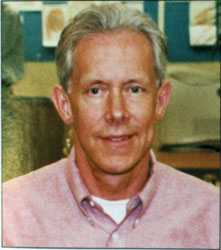Stephen Helm Randak ’67
 Stephen Helm Randak, 66, died August 23 at Indiana University Health Arnett in Lafayette, IN.
Stephen Helm Randak, 66, died August 23 at Indiana University Health Arnett in Lafayette, IN.
Born April 26, 1945, in Chicago, he was the son of Louise and Edward ’42 Randak.
Randak was a member of the track team and Delta Tau Delta while attending Wabash. In 2003 he was awarded with an honorary Ph.D. from Wabash College.
He received his M.S. from Purdue University in West Lafayette in biology and education in 1973. Randak was a biology teacher for North Judson-San Pierre School Corp. from 1967 to 1977, Western School Corp, from 1978 to 1989, and Lafayette Jefferson High School from 1989 to his retirement on May 28, 2009.
He was a member of the National Association of Biology Teachers (NABT), National Science Teachers Association, Hoosier Science Teachers’ Association, Illinois Association of Science Teachers, and a charter member of the Indiana Association of Biology Teachers.
Randak’s awards and honors include, in 2002, NABT’s first Evolution Education Award; 2002 Lilly Endowment Inc. Creativity Fellow; 1994 Access Excellence/Genentech Award; 1993 Presidential Award for Excellence in Science Teaching; 1992 GTE GIFT Award; 1991 Tandy Technology Scholars Program for Outstanding Science Teachers; NABT 1990 Outstanding Biology Teaching Award; and 1989 and 2003 Lilly Inc. Creativity Fellow.
He enjoyed oil and acrylic painting, photography, fly fishing, reading, travel and fossil hunting, playing with his grandchildren and spending time with his family, as well as writing articles for The American Biology Teacher as well as a fantasy adventure book,
and watching college and pro football, basket-ball, and baseball games.
He is survived by wife, Linda Randak; parents; daughters, Shannon Randak and Jodie Oldham; sons, Mark, Randak Matthew Randak, and Jon Oldham; brother, Mark Randak ’71; nephews, Evan Johnson ’01 and Reed Johnson ’98; sisters, Coby Johnson and Kim Henry; and six grandchildren.
A Remembrance
Just stepping into Steve Randak’s class made you want to learn.
I had the pleasure of watching him in action not long after I read about one of his many awards for teaching. I drove to Lafayette expecting to find a typical science lab, but what I walked into was a place of exploration. Students were scattered in groups across a room twice the size of a normal lab. Some were conducting experiments, some were writing them up, others poring over charts and photographs. Everyone was doing something. Now and then a student would come to Steve for guidance. He’d walk over and ask a question or two, shine just enough light on the path so the students could ask their own. Every learning style known to man seemed to be incorporated into this one classroom; the common theme
was fascination.
When it came time for a photograph of their teacher, the students said I should take it in front of the aquarium; they seemed very proud of it. I told Steve that seeing all this made me want to be in science class again. He smiled and said, “It’s never too late to learn.”
When Steve was awarded an honorary doctorate at Wabash in 2003, President Andy Ford read these words: “You have done what the founders of Wabash wanted so fervently when they started this College: You have gone out to teach the children of Indiana in ways that will make them as individuals, and our state as a whole, better for having come into contact with your passion for knowledge.
“In a world where young people are bombarded with enticements for things artificial, base, and harmful, you give them courage and the means to follow their best instincts toward that which is beautiful and natural, the good earth around us.”
Steve responded later that day with an address focusing, not surprisingly, on that good earth around us, and how he had come to understand it:
“The Greek poet Archilocus wrote, ‘The fox knows many things, but the hedgehog knows one big thing.’ As a kid growing up in Montana, I knew this truth, but my fox was a coyote, and my hedgehog was a porcupine. The coyote is a generalist. It is intelligent, resourceful, adaptive, and resistant to the uncertainties and irregularities of everyday life. The porcupine, on the other hand, is devoted to a single system of survival: sharp points. In its reliance on this highly specialized system, it waddles through life bumping into trouble, slow in its progress, but enthusiastic in its faith. The system-trusting porcupine is a specialist.
“I now live in central Indiana within the limits of a fair-sized town that is becoming a city. The coyote is my new neighbor. On cool nights, when the windows are open, his howl slips in with the breeze. In my entire life, I’ve only seen two or three porcupine; all were Montanans. The coyote, a newcomer to Indiana, was not here when I came to Wabash in 1963.
“An education from Wabash creates a generalist. A liberal or general education frees us, empowers us, and prepares us
for those moments that define our lives.
“To track our way through an uncertain future, we will need a long list of specialists from every conceivable field. But we will also need individuals who have a wider vision of the world, who cross-examine their own reality.
“It is the responsibility of places like Wabash to ensure that we don’t run out of these thoughtful generalists.”
Wabash has rarely known a more thoughtful generalist or a more empowering teacher than Steve Randak. His legacy will not end with those he taught, for they learned from him not only science, but also the joyous responsibility of passing it on, and the wonder and pleasure of learning itself—that it’s never too late to learn.
—Steve Charles H’71